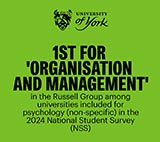
How to apply
Application for PhD and MPhil degrees
The first step in applying is to establish if there is a member of faculty with research interests that overlap with yours who could offer you supervision. We offer supervision in a wide number of areas of Psychological research, but please look at the research and faculty webpages to see the research interests of individual faculty members. Please note that emeritus faculty cannot offer primary supervision. Once you have identified a potential supervisor, please email them to discuss your application and proposed area of research. We expect applicants to formulate a research proposal as part of the application in partnership with their potential supervisor (see more details below). Please do not apply to our department if there is nobody here who is appropriate to supervise work in the area you wish to pursue.
Once you have found a potential supervisor and they have encouraged you to apply, please complete an application for your chosen degree course via the University online application system.
As part of the online application we require a research proposal. We are not looking for a fully worked out 3-year research programme, but we need a summary of the topic that you propose to address that includes key previous research in the area, a statement of your broad aims and specific questions, and some information on the methods that you propose to use to tackle the questions. Research proposals are typically 2-3 pages in length and should be uploaded as word documents in the 'research proposal' section of the online application. We expect applicants to formulate this proposal in consultation with the staff member who will potentially supervise the work. For this reason, it is important that you contact a potential supervisor to discuss your research plans before submitting a formal application
We also ask that you submit with your application a research proposal summary that is 200-250 words (type this into the research proposal summary box in the online application). This summary should be an abstract of your full research proposal (e.g. cover the same broad areas, much more concisely). Whilst your potential supervisor should help you formulate the full research proposal (see above), this summary should be entirely your own work. The clarity and quality of this summary will be assessed as part of your application.
We accept applications all year round, however if you wish to be considered for funding though the Departmental studentship competition or secure a departmental nomination for our University Overseas award, the deadline for applications is usually mid January (for a September start date).
Interview
Once your application has been received, we will interview you to determine your suitability for a postgraduate research degree. Interviews for all applicants will typically be done over Zoom.
Following your interview, you may receive a conditional offer for PhD/MPhil study. This means that we are willing to accept you for a research degree, providing certain conditions are met. For example, you may be required to secure funding and/or complete your current studies to a particular level.
We will invite the strongest applicants in the Departmental studentship competition for a second interview (via Zoom), usually in mid February. We expect that successful candidates will be offered our available studentships by mid-March.
Language requirements
To demonstrate their competence in English, international applicants are normally required to obtain an overall score of 7.0 with a minimum of 7.0 in writing and no less than 6.5 in other components (reading, listening and speaking) in an IELTS test or equivalent. Individual supervisors may require higher scores than this, depending on the topic area. If a suitable language qualification is not available at the time of interview, applicants must provide one before they can take up their studies. Further information is available from Postgraduate Admissions or from the Department.

